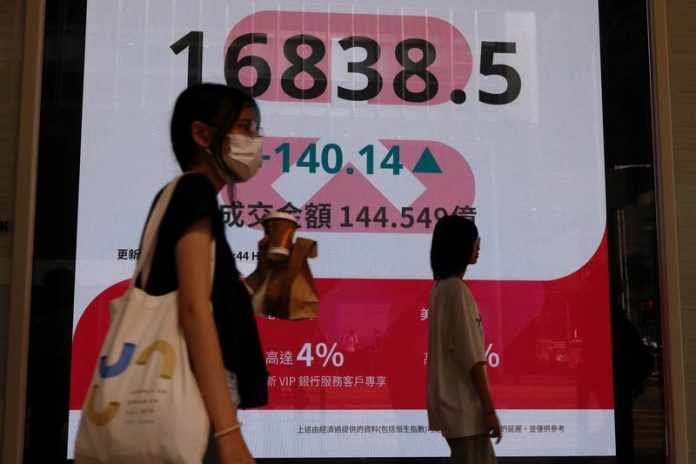By Amanda Cooper
LONDON (Reuters) – Global shares dipped on Tuesday, struggling to draw momentum from a rally on Wall Street as concerns about faltering economic growth dampened investor sentiment, which also weighed on oil.
Data from China showed exports grew at their fastest since March 2023 in August, suggesting manufacturers were rushing out orders ahead of tariffs expected from a number of trade partners, while imports missed forecasts amid weak domestic demand.
That followed Monday’s inflation figures that pointed to still-fragile domestic demand as producer price deflation worsened, keeping alive calls for further stimulus from Beijing to shore up its economy.
This took a chunk out of Asian shares, as well as commodities such as and crude.
Across the broader equity market, MSCI’s All-World index was flat, reflecting modest gains in Europe, where the fell 0.3% and as U.S. stock futures tilted into negative territory.
Investors are anticipating a series of rapid interest rate cuts from the Federal Reserve in the coming months, after last week’s U.S. jobs report painted a picture of a labour market that was slowing.
“Markets are now on hard-landing alert essentially and we’ve seen a return to ‘good news is good news’,” Investec chief economist Philip Shaw said.
Stocks had traded at record highs just two weeks ago, as expectations built for the Fed to deliver some fresh stimulus to the economy by cutting borrowing costs.
But with the all-important labour market slowing, activity across the manufacturing sector in contraction and inflation subsiding, the mood has shifted.
Futures show traders are banking on U.S. rates dropping by a full percentage point by the end of the year, with a near-30% chance of a half-point cut coming as early as next week, according to CME’s Fedwatch tool.
Wall Street had staged an impressive rebound in the previous session, after all three major U.S. stock indexes surged more than 1%, recovering from last week’s selloff.
Later on Tuesday, Democrat Kamala Harris and Republican Donald Trump will debate for the first time ahead of the presidential election on Nov. 5, with the two locked in a tight race.
THE CASE FOR CUTS
Investors now turn their attention to Wednesday’s U.S. inflation report, which could provide more clarity on whether the Federal Reserve would deliver an outsized 50-basis-point cut when it meets next week.
“(Inflation) numbers have been pretty critical over past few months, but it is arguably less this time around. Markets have it firmly established in their minds that price pressures are easing back. What matters more are the projected trends in U.S. economy and the extent to which activity holds up or slows down,” Investec’s Shaw said.
Expectations are for headline inflation in the United States to have slowed to an annual rate of 2.6% in August, compared with July’s 2.9%.
“If the inflation number is any different, or significantly different from expectations, then the number of rate cuts (priced in) will be changed,” Jun Bei Liu, a portfolio manager at Tribeca Investment Partners, said.
“At the moment, I think the market is reasonably aggressive in pricing quite a lot this side of the year, and so that probably opens up for a bit more … volatility that we have seen in the last couple of weeks.”
Oil, which has lost nearly 20% in the last two months alone, driven by concern about global energy demand, was down another 1% at $71.13 a barrel.
Copper futures fell 0.2% to $9,076 a tonne, while iron ore futures dropped 0.5% to $91.30 a tonne, after data showed a drop in Chinese imports.
In currencies, the U.S. dollar surrendered earlier gains against the yen to fall 0.1% to 143.03. The euro was flat at $1.10323, while sterling rose 0.2% to $1.3095. Data earlier showed UK wage growth cooled in the three months to July but remained above 5%.

